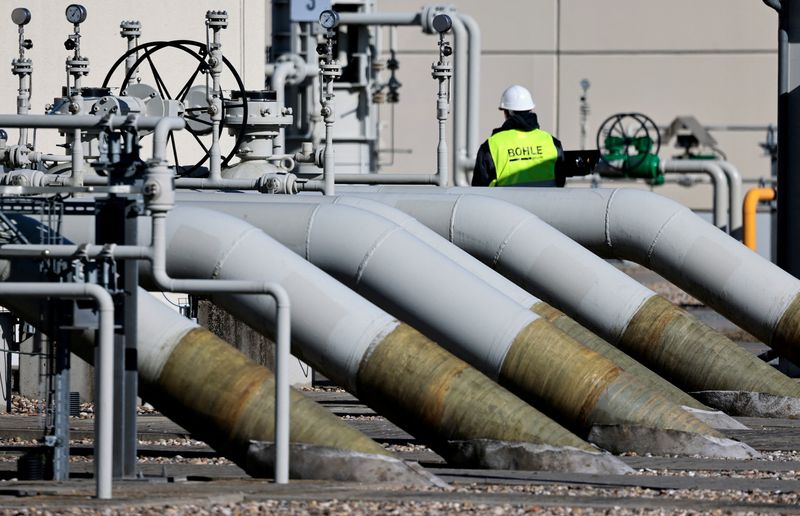
© Reuters. FILE PHOTO: Pipes at the landfall facilities of the ‘Nord Stream 1’ gas pipeline are pictured in Lubmin, Germany, March 8, 2022. REUTERS/Hannibal Hanschke
By Christoph Steitz and Nina Chestney
FRANKFURT/LONDON (Reuters) -Russia halted gas supplies via Europe’s key supply route on Wednesday, intensifying an economic battle between Moscow and Brussels and raising the prospects of recession and energy rationing in some of the region’s richest countries.
European governments fear Moscow could extend the outage in retaliation for Western sanctions imposed after it invaded Ukraine and have accused Russia of using energy supplies as a “weapon of war”. Moscow denies doing this and has cited technical reasons for supply cuts.
Russia’s state energy giant Gazprom (MCX:GAZP) said Nord Stream 1, the biggest pipeline carrying gas to its top customer Germany, will be out for maintenance between 0100 GMT on Aug. 31 and 0100 GMT on Sept. 3.
The pipeline’s operator confirmed no gas was flowing on Wednesday morning.
The president of the German network regulator said Germany was now better prepared for the outages as its gas storage was nearly 85% filled and it was securing supplies from other sources.
“We can take gas from the storage in the winter, we are saving gas (and need to keep doing so!), the LNG terminals are coming, and thanks to Belgium, the Netherlands, Norway (and soon France), gas is flowing,” Klaus Mueller said on Twitter (NYSE:TWTR).
Further restrictions to European gas supplies would deepen an energy crunch that has already triggered a 400% surge in wholesale gas prices since last August, squeezing consumers and businesses and forcing governments to spend billions to ease the burden.
In Germany, inflation soared to its highest in almost 50 years in August and consumer sentiment is projected to hit a record low for the third month in a row next month as households brace for higher energy bills.
LOWER SUPPLIES
Unlike last month’s 10-day maintenance for Nord Stream 1, the latest work was announced less than two weeks in advance and is being carried out by Gazprom rather than its operator.
Moscow, which slashed supply via the pipeline to 40% of capacity in June and to 20% in July, blames maintenance issues and sanctions it says prevent the return and installation of equipment.
Gazprom said the latest shutdown was needed to perform maintenance on the pipeline’s only remaining compressor at the Portovaya station in Russia, saying the work would be carried out jointly with Siemens specialists.
Siemens Energy, which has been carrying out maintenance work on compressors and turbines at the station in the past, said on Wednesday it was not involved in the maintenance but stood ready to advise Gazprom if needed. Russia has also stopped supplying Bulgaria, Denmark, Finland, the Netherlands and Poland completely, and reduced flows via other pipelines since launching what Moscow calls its “special military operation” in Ukraine.
On Tuesday, Gazprom said it would also suspend gas deliveries to its French contractor because of a payments dispute, which France’s energy minister called an excuse, but added that the country had anticipated the loss of supply.
German Economy Minister Robert Habeck, on a mission to replace Russian gas imports by mid-2024, earlier this month said Nord Stream 1 was “fully operational” and there were no technical issues as claimed by Moscow.
‘ELEMENT OF SURPRISE’
Europe’s largest economy is filling its gas storage facilities faster than expected, but it is not yet enough to get the country through winter, he said.
The reduced flows via Nord Stream have complicated efforts across Europe to save enough gas to make it through the winter months, when governments fear Russia may halt flows altogether.
“It is something of a miracle that gas filling levels in Germany have continued to rise nonetheless,” Commerzbank (ETR:CBKG) analysts wrote, noting the country has so far managed to buy enough at higher prices elsewhere.
In the meantime, some Europeans are voluntarily cutting their energy consumption, including limiting their use of electrical appliances and showering at work to save money while companies are bracing for possible rationing.
With storage tanks filled in 83.65%, Germany is already close to its 85% target set for Oct. 1, but it has warned reaching 95% by Nov. 1 would be a stretch unless companies and households drastically cut consumption.
For the European Union as a whole, the current storage level is 80.17%, already ahead of the 80% target set for Oct. 1, when the continent’s heating season starts.
Analysts at Goldman Sachs (NYSE:GS) said their base case assumption was that the latest Nord Stream 1 outage would not be extended.
“If it did, there would be no more element of surprise and reduced revenues, while low flows and the occasional drop to zero have the potential to keep market volatility and political pressure on Europe higher,” they said.
(Reporting Nina Chestney and Christoph Steitz; Additional reporting by Matthias Inverardi, Bharat Govind Gautam and Eileen Soreng; Editing by Veronica Brown, Carmel Crimmins, Lincoln Feast and Tomasz Janowski)
Source: Investing.com





























